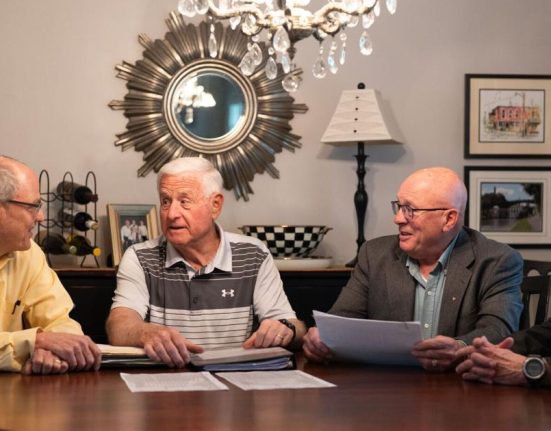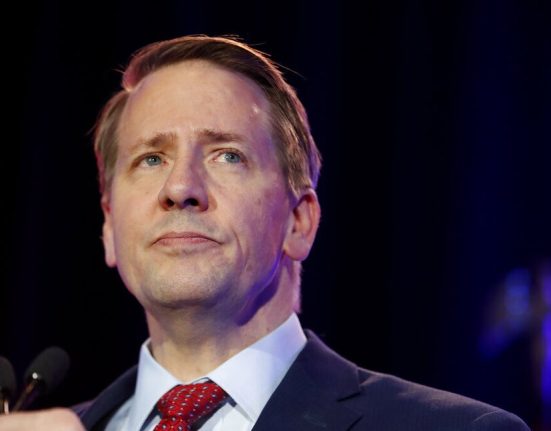LINCOLN — In the waning days of the Nebraska Legislature’s 2024 session, lawmakers are grappling with dwindling time and not enough funds for pet projects they’d like to see funded.
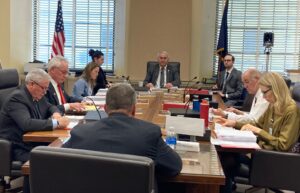
Lawmakers have about $20 million in general funds to be distributed on the floor this year after passing and sending general budget revisions last week to Gov. Jim Pillen for his approval. However, lawmakers are seeking a total of nearly $75 million from bills that have advanced from first-round debate, and more is coming.
Other bills would reduce state revenues. Proposals that have passed first-round debate are calling for reductions of about $28.2 million, including tax credits.
Funding estimates provided here are as of the afternoon of Thursday, March 28.
Should lawmakers pass every bill with a general fund impact that has advanced at least once this year, it would leave them in the next biennium with even less cash, as the state would be $422 million in the hole if every pet project is funded to its max level.
However, lawmakers are statutorily required to have a balanced budget.
Deadlines looming
This Friday is the deadline for bills to advance from first-round debate, though proposals that don’t pass still have a slim chance to find a ride on another bill by the end of day 58 of the 60-day session. Chances are dwindling even further if a bill has a fiscal impact to the state’s main pocketbook: the general fund.
“We have a significant challenge ahead of us for the next eight days,” Speaker John Arch of La Vista said Thursday. “It’s going to require each of us all together to get this done.”
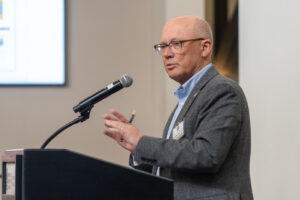
Arch said committee chairs and bill sponsors will need to work on costly bills and determine a path forward. They will be notified which bills need to be worked on, he said, noting that some costly packages of legislation have many bills with no or little impact, and that just one or two are raising the cost.
“It’s those one or two that you’re going to have to take a look at if you want the rest of those bills to move in the package,” Arch said.
‘This bill doesn’t matter’
During debate last week on Lincoln State Sen. Eliot Bostar’s Legislative Bill 937, which would authorize various tax credits, one Appropriations Committee member bluntly said the fight wasn’t about what tax credits to fund.
“Unless you guys find some funding and unless you guys really paid attention to what Speaker Arch said this morning about our funding … this bill doesn’t matter,” State Sen. Myron Dorn of Adams said.
“This bill won’t go nowhere unless you come back and bring us some funding sources back,” he added.
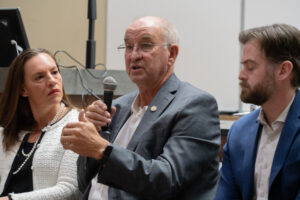
Bostar’s bill, which advanced from the Revenue Committee with 10 tax-related bills, is based on a program in Oklahoma. It would provide a nonrefundable tax credit to family caregivers who incur eligible expenses while caring for and supporting an eligible family member. His part of LB 937 is capped at $2.5 million.
“Family caregivers are the backbone of the U.S. care system, helping parents, spouses and other loved ones remain in homes while providing approximately $600 billion annually in unpaid care,” Bostar said.
Helping pregnant Nebraskans
One of the most contentious points of LB 937’s multi-day debate came in whether to include Thurston State Sen. Joni Albrecht’s LB 606, the Nebraska Pregnancy Help Act, which would provide a dollar-for-dollar income tax credit for donations to eligible pregnancy help organizations. Bostar voted against including LB 606 in his bill, which he prioritized on the floor.
Critics, such as the ACLU of Nebraska, sometimes refer to these facilities as “crisis pregnancy centers” and contend the organizations provide inaccurate information about abortion.

Albrecht’s bill would prohibit tax credits to organizations that provide, pay for, cover, refer, recommend or promote abortions.
She initially asked for $10 million in annual tax credits — LB 937 caps it at $2 million, but Albrecht said she hopes lawmakers annually add $2 million until they reach her original goal.
“It’s really helping women and they’ve been doing this for years on public dollars — people just donate to them,” Albrecht said of her bill.
State Sen. John Cavanaugh of Omaha divided the committee amendment on LB 937, which involved pulling out Albrecht’s section for a centered discussion on that section and a separate vote.
Bostar, in an attempt to address some opponents’ concerns, suggested that lawmakers expand the definition of eligible organizations to include those that more generally support pregnant Nebraska women but still exclude ones that directly provide, pay for or cover abortions.
Bostar’s amendment failed 17-24, and LB 606 was added to the overall package 28-15.
Lawmakers also voted to add two provisions to LB 937: One, LB 58, to provide a sales and use tax exemption for diapers, from Cavanaugh, and LB 1047, to change certain motor fuel tax provisions to match industry practice, from Plymouth State Sen. Tom Brandt.
LB 937 advanced 40-0 and is estimated to reduce state revenues by $8.6 million in the next fiscal year, followed by $21.2 million and $24.6 million in the succeeding years.
‘We know how to do the math’
Bostar, a member of the Revenue Committee, told his colleagues that part of the Legislature’s work means advancing bills to second-round debate for a more accurate fiscal note. This is because the Legislature’s fiscal office can assess the fiscal impact of combined items after a bill advances from first-round debate.
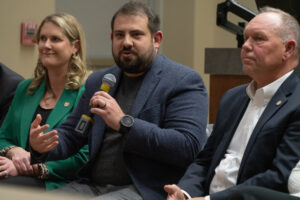
“We look to see what’s possible, what needs to be removed, what needs to get cut, what needs to get trimmed down, where we need to source additional funds — we make all those decisions on select. That’s how we’ve been doing it year over year,” Bostar said.
“We haven’t driven the state into the red, so I hope everyone has the confidence that we can do that again,” he continued.
Bostar said the Revenue Committee will have an additional package that will come to the floor this year that will add money for lawmakers to use (it’s unclear what package this would be), so he said lawmakers can be cautious but also trusting.
“I appreciate the anxiety, but I want to offer some reassurance that we know how to do the math on this, too,” he said.
Breaking down some of the costliest proposals
Costly funding proposals that have advanced to the legislative floor but have not yet passed include:
- Annual $25 million cost: The costliest request on the floor is Elkhorn State Sen. Lou Ann Linehan’s personal priority, LB 1402, which would send $25 million to the state treasurer as a secondary means of providing educational scholarships for students to attend K-12 private schools. The measure would grow annually, up to $100 million. Voters will decide the fate of last year’s Opportunity Scholarships Act in the November election. LB 1402 has not yet come up for first-round debate but is expected this week.
- More than $20 million: The next biggest ask is Fremont State Sen. Lynne Walz’s personal priority: LB 1284. It is a package of education-related bills focused on computer science and technology, dyslexia research, menstrual products being provided in select schools, reading instruction for teachers, special education and more. It has a first-year impact of $17.3 million in costs and $3.5 million in reduced revenues. The ongoing cost is about $13.5 million in combined expenses and reduced revenue.
- Annual $10 million cap: LB 856, from State Sen. John Fredrickson of Omaha, which is modeled after a Kentucky-based initiative to bring more child care workers to Nebraska. It would make all child care workers eligible for their own child care aid. The bill has an additional $53,000 oversight cost in the first year and $74,000 in subsequent years.
- More than $8 million: LB 1023, from State Sen. Brad von Gillern of Omaha, includes provisions of LB 1400, introduced by State Sen. Beau Ballard of Lincoln at the governor’s request. Ballard’s proposal would provide tax credits for employers who provide relocation expenses to certain employees for relocation expenses, not to exceed a maximum credit of $5,000 per qualifying employee. With other provisions in von Gillern’s bill, it would reduce state revenues by $8.6 million in the first year, followed by $53.1 million and $67 million in the next two fiscal years.
- Just under $7 million: LB 358, from Walz, would increase reimbursement rates for dental services provided by Medicaid by 25%. The cost of $6.9 million would be matched by $13.1 million in federal funds.
- Just under $5 million: LB 1329, from State Sen. Dave Murman of Glenvil, is a package of legislation from the Education Committee, which he chairs. The fiscal impact is from LB 673, from State Sen. Ben Hansen of Blair, which would authorize schools to provide mapping data to local, county or state public safety agencies for emergency response efficiency. The cost ($4.995 million) is if all 1,427 schools adopt the policy.
Fiscal notes are not always what they appear. For example, LB 126, a package of legislation led by State Sen. Jen Day of Omaha, seeks to change homestead exemption provisions for veterans, define the term “occupy” for homestead exemptions and change provisions relating to the correction of assessment and tax rolls.
A modified fiscal impact of LB 126 reduced its first-year cost estimate from $19 million to $382,617. However, it carries a sizable impact in future years: $71.3 million and $77 million, respectively.
By Nebraska Examiner reporter Zach Wendling


